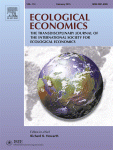
February 2015
The article « Renewable electricity producing technologies and metal depletion: A sensitivity analysis using the EROI », by Florian Fizaine and Victor Court, is published in Ecological Economics.
Abstract:
More and more attention is being paid to renewable technologies because they are seen as a great opportunity to disengage our society from its dependence on fossil fuels. Such flow-based energy resources that rely on solar energy are supposed to lead us toward a sustainable energy future. However, because of their high capital intensity, renewable technologies require large amounts of matter, including both common and rare metals. These metals require energy for their production, and more specifically for their extraction. The energy cost associated with metal extraction is linked to mineral ore grade, meaning that as depletion progresses, energy cost increases. In addition, renewable energy resources deliver less net energy to society compared to fossil fuels, because of their diffuse nature. It is therefore easy to see that a close relationship exists between energy and metal sectors. In this article, we describe more precisely this relationship by investigating how the energy requirement associated with metal extraction could impact the energy-return-on-investment (EROI) of different renewable and nuclear technologies. More precisely, we present a methodology that can be used to calculate the sensitivity of the EROI of a given technology to a specific or to multiple metal ore grade degradation. We found that if considered separately, the qualitative depletion of a given metal has no significant impact on the EROI of renewable and nuclear technologies, unless its concentration approaches very low grade. However, if all metals are considered together, the EROI of these same technologies could be importantly diminished, especially if they tend to very low concentrations.
